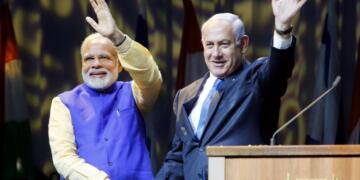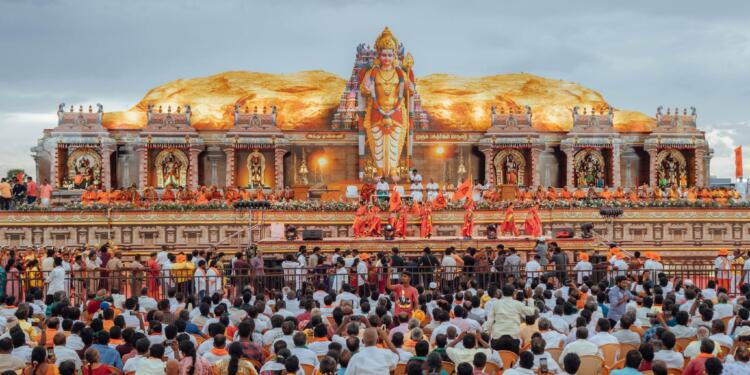The Murugan Bhaktargal Conference held in Madurai on June 22, 2025, has emerged as a pivotal moment in Tamil Nadu’s political transformation. Organised by Hindu Munnani and supported by key leaders from the NDA, the grand religious gathering is being seen as a strategic move by the BJP to strengthen its presence in the Dravidian heartland.
With a swelling sea of Murugan devotees in attendance and the spiritual narrative woven with political undertones, the conference has laid the foundation for a new form of cultural nationalism aimed at consolidating Hindu votes in Tamil Nadu. By invoking Lord Murugan’s deep cultural and religious resonance, the NDA seeks to reclaim political space dominated by the DMK and it’s allies in the last few years
Why Tamil Nadu Needs Hindu Unity Now More Than Ever
Tamil Nadu, a land steeped in spiritual legacy, has in recent times witnessed increasing politicization of religious sentiments. In this climate, the call for unity among Hindus is not just about faith, but a defence against ideological encroachment that belittles traditions and mocks spiritual expressions.
Andhra Pradesh Deputy Chief Minister Pawan Kalyan’s fiery speech at the Murugan conference struck a chord as he warned those who “mock Hindu beliefs” and challenged the selective secularism that targets only Hinduism. Leaders including former TN BJP state President K. Annamalai emphasised that it is time for Hindus to stand united, echoing a broader sentiment that cultural pride must translate into political will.
Religious Sentiment Meets Electoral Strategy Ahead of 2026 Polls
The Murugan Bhaktargal Conference in Madurai comes at a strategically crucial time as Tamil Nadu heads toward the 2026 Assembly elections. In the 2021 polls, the BJP contested in alliance with the AIADMK but managed to win only 4 out of 20 seats it contested, while the AIADMK lost power to the DMK, which secured a comfortable majority with 159 out of 234 seats.
The alliance between the BJP and AIADMK fractured ahead of the 2024 Lok Sabha elections, where both parties contested separately and struggled to make significant gains against the DMK-led INDIA bloc. However AIADMK and BJP has joined hands once again ahead of assembly polls in the state. The Murugan conference signals a fresh attempt to rebuild this alliance on the common ground of Hindu consolidation. With religious sentiments playing a rising role in shaping political narratives, this event is being used to energize cadres and attract undecided Hindu voters. The renewed BJP-AIADMK camaraderie, if sustained, could present a formidable front in 2026.
DMK’s Anti-Hindu Legacy in the Crosshairs
Throughout the event, BJP and its allies did not shy away from pointing fingers at the DMK. Accusations flew over the ruling party’s alleged double standards and repeated affronts to Sanatan Dharma. BJP leaders accused DMK of fostering division in the name of language, race, and caste, while subtly attacking Hindu customs.
Pawan Kalyan indirectly addressed DMK’s criticism of the Murugan conference, defending the right to celebrate faith and questioning why Hindu practices face opposition when other religions are spared similar scrutiny. The conference also recalled previous incidents, like the mocking of Kanda Sashti Kavasam, and questioned why such acts continue under the watch of the DMK regime.
In 2023, Tamil Nadu Minister Udhayanidhi Stalin courted massive outrage after calling for the “eradication” of Sanatan Dharma, likening it to diseases like dengue and malaria. His remarks were widely slammed across the country for insulting Hindu faith and beliefs. Critics say this wasn’t an isolated comment but a reflection of DMK’s deep-rooted disdain for Hindu traditions. From targeting temple practices to mocking religious sentiments, the party has repeatedly taken positions that hurt the majority community’s spiritual identity. Udhayanidhi’s statement underscored the DMK’s continued attack on Sanatan principles under the garb of rationalism
Celebrating Murugan: A Pan-Indian Deity of Devotion
Lord Murugan, also known as Karthikeya or Subramanya, holds a revered position not only in Tamil Nadu but across South India and even in the North. Known as the warrior god and embodiment of wisdom, he commands immense devotion through his six sacred abodes, the Arupadai Veedu. Madurai’s conference celebrated this shared faith, turning religious devotion into a unifying force that transcends linguistic and regional boundaries. BJP leaders underlined that the aim was not merely celebration, but reaffirming a cultural identity rooted in faith.
The Six Resolutions That Echoed Devotee Sentiment
At the culmination of the conference, six major resolutions were unanimously passed:
- Karthigai Deepam at Thirupparankundram Hill – a call for formal celebrations atop Murugan’s first abode.
- Support for PM Modi’s Strong Leadership – especially for Operation Sindoor in response to the Pahalgam terror attack.
- Protection of Murugan Hills and Temples – a demand to preserve religious heritage.
- End of Government Control Over Temples – seeking the removal of the HR&CE Department.
- Hindu Electoral Unity – urging cohesive voting to protect religious and cultural interests.
- Shashti Observance Across Tamil Nadu – promoting monthly collective recitals of Kanda Shashti Kavasam.
A Cultural Awakening with Political Ripples
The Murugan Devotees Conference wasn’t just a display of religious fervour it was a statement of cultural and political intent. With Pawan Kalyan, Annamalai, L. Murugan, and other leaders asserting the need to safeguard Hindu identity, the NDA appears poised to reposition itself as the voice of Sanatan values in Tamil Nadu.
As the state witnesses rising tensions over cultural expressions, the event could very well serve as the springboard for a Hindu political resurgence that may challenge the entrenched Dravidian dominance. The unity seen in Madurai might just be the spark that reignites Tamil Nadu’s spiritual and political landscape.























